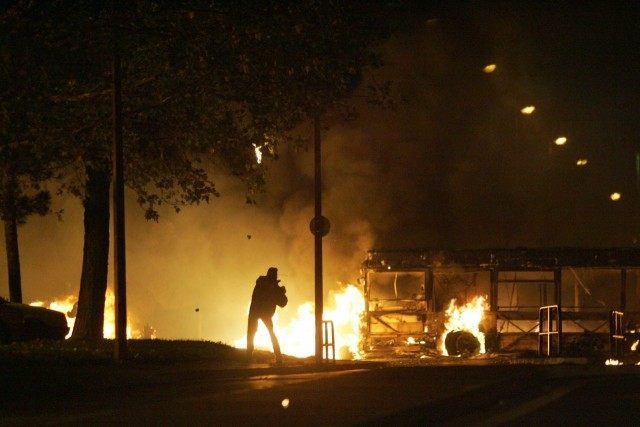A decade on from fierce rioting which rocked Paris suburbs for three weeks in October 2005, experts have warned that the conditions are ripe for a re-run of those events. Numerous initiatives and billions of Euros spent in the banlieues over the intervening years have changed things – “the situation has worsened” one expert claims.
27th October marks the tenth anniversary of the events that sparked the riots: as police investigated a break in at a building site in Clichy-sous-Bois in northwest Paris, a number of local teenagers scattered to avoid interrogation. Three ran down a dead-end alley leading to an electricity substation.
Two of the three, 15-year-old Banou from Mali and his 17-year-old Tunisian friend, Ziad were killed. The third was severely injured.
Quickly, a rumour that the boys had been driven to their deaths by police officers spread, although the police denied they were even chasing them. But the rumour was enough to spark violence in a downtrodden suburb, where the largely immigrant population struggled to find work. The unemployment rate within the suburb was running at 20 per cent, rising to 40 per cent among the youth population.
By mid-November when the riots finally died down, thousands of cars and buildings had been torched and three people were dead, one of whom, 56-year-old Jean-Claude Irvoas, was beaten to death by the rioters after he tried to stop them stealing his camera.
Commenting on the anniversary, Malek Boutih, an MP in south Paris said: “In 10 years, things have changed, in that the situation has worsened. It’s more difficult now than in the past.
“There’s been a decline that has set in in recent years that is approaching on the irreparable, because ten years on these suburbs are no longer producing rioters, they are producing terrorists.”
According to Boutih, efforts to improve the situation have failed to yield results as the authorities have not tackled the root of the problem, The Local has reported. “The economic aspect is not the heart of the problem, it’s a lot more vast,” he said.
The racial tensions underpinning the riots were apparent even as they were taking place. Reporting mid-way through the riots, Der Spiegel noted that the three most senior ministers of the time, President Jacques Chirac, Prime Minister Dominique de Villepin, and interior minister Nicolas Sarkozy “seem to have realized that integration à la française – which has transformed newcomers into citizens since the French Revolution – has failed.”
It continued: “Social divisions in today’s French society run along ethnic and religious lines, and they also signify deep cultural rifts. The ideal of the French republic – the nation as a community of the willing, of citizens who enjoy equal rights, regardless of their ethnic origins or religious beliefs – is giving way to a volatile co-existence among communities that want to retain their identities and live according to their own rules.
“The strict separation of church and state, a sacrosanct pillar of French government, has become an illusion. Jihad may not be what’s inspiring the rioters, but Islam is undeniably an inseparable component of their self-identity. Islam strengthens their sense of solidarity, gives them the appearance of legitimacy and draws an unmistakable line between them and the others, the “French.””
Aside from the racial tensions, the problems of poverty and disillusionment still remain. “They still haven’t fixed the problem of schooling, of access to health, culture and public services as well as to training and jobs,” said Mohemmed Mechmache, who founded the charity ACLEFEU (Collective association for Liberty, Equality, Fraternity, Together United) in the aftermath of the 2005 riots. “All of these problems remain.”

COMMENTS
Please let us know if you're having issues with commenting.